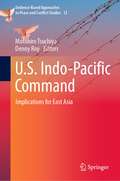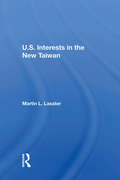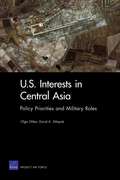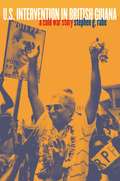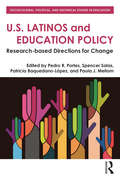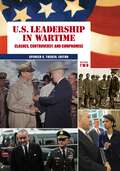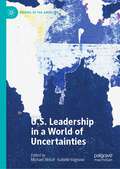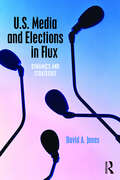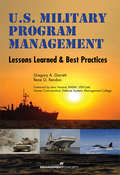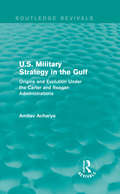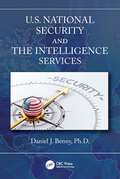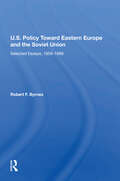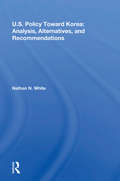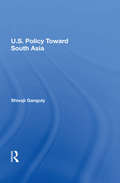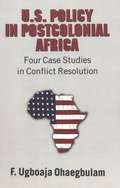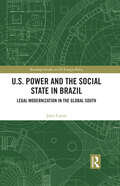- Table View
- List View
U.S. Indo-Pacific Command: Implications for East Asia (Evidence-Based Approaches to Peace and Conflict Studies #12)
by Denny Roy Motohiro TsuchiyaThe purpose of this book is to introduce readers to INDOPACOM, which is responsible for U.S. military operations in a region covering approximately 50 percent of the Earth from the Pacific Ocean to the Indian Ocean. INDOPACOM has not received much attention in Japan compared to USFJ or the US Seventh Fleet. This book shines a spotlight on INDOPACOM in an effort to promote an understanding of its various aspects. The mission of INDOPACOM is to protect U.S. territory, people, and national interests. However, it also includes protection of the countries within its geographic scope that are U.S. allies and security partners. INDOPACOM and its precursor Pacific Command, established in 1947, have always been major contributors to the peace and safety of Japan in the post-World War II era. In view of the importance of U.S. interests in Northeast Asia, the region also has two Sub-Unified Combatant Commands called United States Forces Japan (USFJ) and United States Forces Korea (USFK). Each of these organizations strives to strengthen the relationship with the Japan Self-Defense Forces and the Republic of Korea armed forces. Together, the United States, Japan and our partners around the globe will continue to safeguard the rules-based security order that has underpinned peace and prosperity for decades.
U.S. Interests In The New Taiwan
by Martin L LasaterFocusing on a persistent crux of Sino-American relations, the author shows how an essentially new Taiwan has emerged in terms of political, economic, diplomatic and security developments. He explores the future prospects of the new Taiwan and analyzes its implications for US interests and policy.
U.S. Interests in Central Asia: Policy Priorities and Military Roles
by Olga Oliker David A. ShlapakThe republics of Central Asia became more important to United States when U.S. forces were deployed there in support of Operation Enduring Freedom. The authors examine U.S. interests in the region, identify three main components of a successful military strategy there; and conclude that the U.S. military should have a relatively minor, but important, role in U.S. policy toward this part of the world.
U.S. International Economic Strategy in a Turbulent World: Strategic Rethink
by Howard J. ShatzThis report presents strategic choices America faces regarding the international economy over the term of the next U.S. administration, focusing on policy choices in the areas of maintaining and improving the rules-based international economic system; working with China and better integrating it into the existing system; supporting economic growth of allies and partners; and using sanctions to change unwanted behavior and counter adversaries.
U.S. Intervention in British Guiana
by Stephen G. RabeIn the first published account of the massive U.S. covert intervention in British Guiana between 1953 and 1969, Stephen G. Rabe uncovers a Cold War story of imperialism, gender bias, and racism.When the South American colony now known as Guyana was due to gain independence from Britain in the 1960s, U.S. officials in the Kennedy and Johnson administrations feared it would become a communist nation under the leadership of Cheddi Jagan, a Marxist who was very popular among the South Asian (mostly Indian) majority. Although to this day the CIA refuses to confirm or deny involvement, Rabe presents evidence that CIA funding, through a program run by the AFL-CIO, helped foment the labor unrest, race riots, and general chaos that led to Jagan's replacement in 1964. The political leader preferred by the United States, Forbes Burnham, went on to lead a twenty-year dictatorship in which he persecuted the majority Indian population. Considering race, gender, religion, and ethnicity along with traditional approaches to diplomatic history, Rabe's analysis of this Cold War tragedy serves as a needed corrective to interpretations that depict the Cold War as an unsullied U.S. triumph.
U.S. Latinos and Education Policy: Research-Based Directions for Change (Sociocultural, Political, and Historical Studies in Education)
by Pedro R. Portes Spencer Salas Patricia Baquedano-López Paula J. MellomWith the American dream progressively elusive for and exclusive of Latinos, there is an urgent need for empirically and conceptually based macro-level policy solutions for Latino education. Going beyond just exposing educational inequalities, this volume provides intelligent and pragmatic research-based policy directions and tools for change for U.S. Latino Education and other multicultural contexts. U.S. Latinos and Education Policy is organized round three themes: education as both product and process of social and historical events and practices; the experiences of young immigrants in schools in both U.S. and international settings and policy approaches to address their needs; and situated perspectives on learning among immigrant students across school, home, and community. With contributions from leading scholars, including Luis Moll, Eugene E. Garcia, Richard P. Durán, Sonia Nieto , Angela Valenzuela, Alejandro Portes and Barbara Flores, this volume enhances existing discussions by showcasing how researchers working both within and in collaboration with Latino communities have employed multiple analytic frameworks; illustrating how current scholarship and culturally oriented theory can serve equity-oriented practice; and, focusing attention on ethnicity in context and in relation to the interaction of developmental and cultural factors. The theoretical and methodological perspectives integrate praxis research from multiple disciplines and apply this research directly to policy.
U.S. Leadership in Wartime: Volume 1
by Spencer TuckerNow from one of the world's leading publishers of military history comes a breakthrough book on one of the most important and complex aspects of U.S. national defense. U.S. Leadership in Wartime: Clashes, Controversy, and Compromise offers a comprehensive analysis of the characteristics that constitute effective leadership in war and discusses the often contentious relationships between U.S. civilian and military leadership throughout American history.
U.S. Leadership in a World of Uncertainties (Studies of the Americas)
by Michael Stricof Isabelle VagnouxThis book analyzes the transformations and consistencies of American leadership during the past few years and situates recent American foreign policy in a longer time frame, following the 2020 presidential election and after a full year of the Biden Administration. This longer and broader view by European and American academics and experts considers both shifting American policies, notably during Trump’s presidency, and underlying trends that have often gone ignored compared to the more dramatic antics of the 45th president. It helps decode recent American policy and permits us to consider possible new directions and likely continuities under Democratic leadership.
U.S. Leadership, History, and Bilateral Relations in Northeast Asia
by Gilbert RozmanWhereas most discussions of history have centered on the rift between China and Japan, this book focuses on three other divisions stemming from deep-seated memories within Northern Asia, which increasingly will test U. S. diplomacy and academic analysis. The first division involves long-suppressed Japanese and South Korean memories that are critical of U. S. behavior - concerning issues such as the atomic bombings, the Tokyo Tribunal, and the Korean War. The second division is the enduring disagreement between Japan and South Korea over history. What can the United States do to invigorate urgently needed trilateral ties? The third and most important division is the revival of a sinocentric worldview, which foretells a struggle between China and other countries concerning history, one that has already begun in China's dispute with South Korea and is likely to implicate the United States above all.
U.S. Marines and Amphibious Warfare (Princeton Legacy Library #2407)
by Philip A. Crowl Jeter A. Isely"Not only a just appraisal of the campaigns waged by Marines in World War II; it is a documentation of the Marine struggle to prove the feasibility of amphibious warfare.... Relentlessly accurate and impartial." —N.Y. Times.Originally published in 1951.The Princeton Legacy Library uses the latest print-on-demand technology to again make available previously out-of-print books from the distinguished backlist of Princeton University Press. These editions preserve the original texts of these important books while presenting them in durable paperback and hardcover editions. The goal of the Princeton Legacy Library is to vastly increase access to the rich scholarly heritage found in the thousands of books published by Princeton University Press since its founding in 1905.
U.S. Marshals: Inside America's Most Storied Law Enforcement Agency
by David Fisher Mike EarpDeputy U.S. Marshal: How often did you draw your gun?Retiring FBI Agent: Never. You?Deputy U.S. Marshal: Seven times before lunch.123,006 FugitivesThat's how many wanted men and women, each with an average of four felony convictions to his or her name, the U.S. Marshals Service tracked down and arrested in 2012. Of that number, 3,962 were charged with murder, most were violent career criminals, and all were on the run from the authorities. If you are a fugitive in America, your worst nightmare is a deputy U.S. marshal on your trail: each year the Marshals Service takes more criminals off the streets than every other federal law enforcement agency—combined.From Mike Earp, the former associate director of operations for the Marshals Service, and New York Times bestselling author David Fisher, this book tells the thrilling inside story of today's U.S. marshals in their own words. Based on interviews with more than fifty current and former deputies, as well as Earp's personal case notes, here are the greatest cases, hairiest arrests, and most unforgettable moments, all revealed for the first time. Here also is a history of how the marshals of legend have evolved into the country's frontline law enforcement agency, charged with apprehending the most notorious and dangerous suspects. The U.S. Marshals Service is America's oldest law enforcement agency, established in 1789 by George Washington, who called for "the selection of the fittest characters to expound the law and dispense justice." It has had a long and colorful history, famously interwoven into the mythology of the Wild West, with notable real-life marshals like Wyatt Earp and Bass Reeves and legendary fictional characters like Matt Dillon, Elmore Leonard's Raylan Givens, and Rooster Cogburn, played by John Wayne in the 1969 film True Grit.However, what few people realize is that in the past three decades the marshals have been at the heart of a transformation of the entire structure of law enforcement in America. The Marshals Service has become the most effective U.S. law enforcement agency, responsible for tracking down the nation's most wanted fugitives. Organized under the Department of Justice, the marshals serve as the apprehension arm for most federal agencies, including the FBI and the DEA, and across the nation U.S. Marshals regional task forces aid state and local law enforcement authorities to catch the most dangerous fugitives. All told, the Marshals Service processes more than 150,000 warrants each year, and deputies make an average of 337 arrests per day. They are also charged with transporting federal prisoners, protecting judges, and operating the Witness Security Program.This is the untold story of the new U.S. Marshals Service, as seen through the eyes of the men and women who were pivotal in solving many of the most high-profile and dangerous cases in recent history.
U.S. Media and Elections in Flux: Dynamics and Strategies
by David A. JonesPaid, earned, and social media are all crucial elements of modern electioneering, yet there is a scarcity of supplementary texts for campaigns and election courses that cover all types of media. Equally, media and politics courses cover election-related topics, yet there are few books that cover these subjects comprehensively. This brief and accessible book bridges the gap by discussing media in the context of U.S elections. David A. Jones divides the book into two parts, with the first analyzing the wide array of media outlets citizens use to inform themselves during elections. Jones covers traditional, mainstream news media and opinion/entertainment-based media, as well as new media outlets such as talk shows, blogs, and late-night comedy programs. The second half of the book assesses how campaigns and candidates have adapted to the changing media environment. These chapters focus on earned media strategies, paid media strategies, and social media strategies. Written in a concise and accessible style while including recent scholarly research, the book will appeal to students with its combination of academic rigor and readability. U.S. Media and Elections in Flux will be a useful supplementary textbook for courses on campaigns and elections, media and politics, and American introductory politics.
U.S. Militarism and the Terrain of Memory: Negotiating Dead Space (Media, War and Security)
by John BechtoldThis book analyzes how the Iraqi city of Fallujah became registered as a setting for military heroics in American memory.In 2004, the U.S. military conducted two disastrous assaults in Fallujah, Iraq. More than 1,000 citizens were killed, and, according to the military’s own estimate, upwards of 200,000 people were displaced because of the violence. Yet, despite this human catastrophe, the kind of information that emerged in the public domain during the battle foregrounded the soldier's experience in war while effacing the destruction of Iraqi bodies. This tendency to foreground the soldier body is a direct result of the military’s intervention in what they conceptualize as the "information environment." This book draws from the second assault in Fallujah as a case study to explicate the military’s investment in this perspectival space, which is a consequence both of the mediatization of contemporary war and of the need to influence knowledge considered unfavorable to military operations. In short, the military enlists the media in their targeting process to produce information that is then deployed as persuasive force to modify the beliefs of specific target populations. When the cultural texts produced by the media are remediated in the public domain after war, they can be thought of as martial constructs because they originated during war through the military’s systemized attempt to influence knowledge. That is, these texts trace to a specific battlefield objective. This book reframes the notion of propaganda as a generalized public relations strategy into a more acute and coordinated attempt to decontextualize specific knowledge in the information environment.This book will be of much interest to students of media and communication studies, war studies, memory studies, and international relations.
U.S. Military Information Operations in Afghanistan: Effectiveness of Psychological Operations 2001-2010
by Arturo MunozThe U. S. Marine Corps, which has long recognized the importance of influencing the civilian population in a counterinsurgency environment, requested an evaluation of the effectiveness of thepsychological operations element of U. S. military information operations in Afghanistan from 2001 to 2010 based on how well messages and themes were tailored to target audiences. This monograph responds to that request.
U.S. Military Intervention in the Post-Cold War Era: How to Win America's Wars in the Twenty-first Century (Political Traditions in Foreign Policy Series)
by Glenn J. AntizzoDuring the post--World War II era, American foreign policy prominently featured direct U.S. military intervention in the Third World. Yet the cold war placed restraints on where and how Washington could intervene until the collapse of the former Soviet Union removed many of the barriers to -- and ideological justifications for -- American intervention. Since the end of the cold war, the United States has completed several military interventions that may be guided by motives very different from those invoked before the collapse of the Berlin Wall. Likewise, such operations, now free from the threat of counterintervention by any other superpower, seem governed by a new set of rules.In this readily accessible study, political scientist Glenn J. Antizzo identifies fifteen factors critical to the success of contemporary U.S. military intervention and evaluates the likely efficacy of direct U.S. military involvement today -- when it will work, when it will not, and how to undertake such action in a manner that will bring rapid victory at an acceptable political cost. He lays out the preconditions that portend success, among them a clear and attainable goal; a mission that is neither for "peacekeeping" nor for "humanitarian aid within a war zone"; a strong probability the American public will support or at least be indifferent to the effort; a willingness to utilize ground forces if necessary; an operation limited in geographic scope; and a theater commander permitted discretion in the course of the operation. Antizzo then tests his abstract criteria by using real-world case studies of the most recent fully completed U.S. military interventions -- in Panama in 1989, Iraq in 1991, Somalia in 1992--94, and Kosovo in 1999 -- with Panama, Iraq, and Kosovo representing generally successful interventions and Somalia an unsuccessful one. Finally, he considers how the development of a "Somalia Syndrome" affected U.S. foreign policy and how the politics and practice of military intervention have continued to evolve since the terrorist attacks of September 11, 2001, giving specific attention to the current war in Afghanistan and the larger War on Terror. U.S. Military Intervention in the Post--Cold War Era exemplifies political science at its best: the positing of a hypothetical model followed by a close examination of relevant cases in an effort to provide meaningful insights for future American international policy.
U.S. Military Program Management: Lessons Learned and Best Practices
by Gregory A. Garrett PMP Rene G. Rendon PMPAn indispensable resource for all defense industry professionals—governmental and commercial!Introducing the only book on the market offering valuable best practices and lessons learned for U.S. military program managementThe U.S. Department of Defense and the related defense industry together form the largest and most powerful government and business entity in the world, developing some of the most expensive and complex major systems ever created.U. S. Military Program Management presents a detailed discussion, from a multi-functional view, of the ins and outs of U.S. military program management and offers recommendations for improving practices in the future. More than 15 leading experts present case studies, best practices, and lessons learned from the Army, Navy, and Air Force, from both the government and industry/contractor perspectives.This book addresses the key competencies of effective U.S. military program management in six comprehensive sections:• Requirements management• Program leadership and teamwork• Risk and financial management• Supply chain management and logistics• Contract management and procurement• Special topics
U.S. Military Strategy in the Gulf: Origins and Evolution Under the Carter and Reagan Administrations (Routledge Revivals)
by Amitav AcharyaFirst published in 1989, this title explores the nature and dimensions of the U.S. strategy in the Gulf in the formative years that followed the fall of the Shah, the Soviet invasion of Afghanistan and the outbreak of the Iran-Iraq war. It describes the formation of the U.S. Rapid Deployment Joint Task Force and the U.S. Central Command, their force structure and the network of U.S. bases and facilities in the region. The role of pro-Western countries in the wider region, in particular Pakistan, Egypt, Jordan, and Israel, in the formulation of strategy is discussed in detail, along with a more general assessment of the achievements and failures of U.S. strategy in the Gulf towards the end of the 1980s. In light of the persistent struggle for peace within the Middle East, this is a timely reissue, which will be of great interest to students researching U.S. military strategy over the past thirty years.
U.S. National Security and the Intelligence Services
by Daniel J. BennyWhile there are books that cover national security, intelligence collection, intelligence analysis, and various intelligence services, U.S. National Security and the Intelligence Services is the first, all-inclusive book to examine intelligence agencies as a direct function of national security. It serves as a comprehensive text for students and a resource for those in the intelligence profession and national security scholars. The book offers an in-depth understanding of the important role that the intelligence services provide to the national security of a nation. It also includes information on the various types of intelligence, collection methods, tradecraft and intelligence analysis methods, as well intelligence-related resources. Coverage provides an overview of what national security is and its relationship to intelligence services of the United States, its key allies, and hostile nations. Key Features: Identifies the various national security threats and details the numerous U.S. and key allied intelligence services that work and collaborate to mitigate such threats Reviews the types of intelligence—outlining intelligence collection methods and intelligence tradecraft Explores how to determine the value of the intelligence collected, explaining the various methods of intelligence analysis and optimal methods to present conclusions The roles the various agencies in the intelligence services play are as vital as the intelligence collected, the means by which it’s collected, and the methodology in which it is disseminated and analyzed. U.S. National Security and the Intelligence Services provides a handy reference outlining the framework, and the processes, that comprise the US intelligence apparatus.
U.S. Nuclear Weapons in Canada
by John ClearwaterIn this second volume of his nuclear weapon series, John Clearwater continues to investigate the presence of American nuclear weapons in Canada. In Canadian Nuclear Weapons, Clearwater told the story of nuclear weapons that were in the hands of Canadian forces during the Cold War. In U.S. Nuclear Weapons in Canada, he goes further, looking at nuclear weapons held by American forces on Canadian soil. His purpose is to bring together until-recently secret information about the nature of the nuclear weapons stored, stationed, or lost in Canada by the United States Air Force and the United States Navy, and combines it with known information about the systems in the U.S. nuclear arsenal.The history of the atomic bomb in Canada goes back to the first years immediately after World War II when the U.S. government, under the prodding of the newly created Strategic Air command, began a slow and steady process of talks designed to allow Goose Bay to be groomed for the eventual acceptance of nuclear weapons.Crashes and nuclear accidents. Conspiracies and cover-ups. Clearwater examines them all in great detail. The reader will see for the first time the minutes of Cabinet and the Cabinet Defence Committee meetings in which the storage of nuclear weapons are discussed. Also printed here for the first time are the agreements between Canada and the U.S. for the storage of nuclear weapons. Many of the documents presented here were until recently classified as secret, and many were top secret.
U.S. Overseas Military Presence: What Are the Strategic Choices?
by Lynn E. Davis Stacie L. Pettyjohn Melanie W. Sisson Stephen M. Worman Michael J. McnerneyThe role of the United States and its global military presence are under debate in the face of changing strategic and economic realities. The authors present a menu of global postures and compare them in terms of the U. S. Air Force bases, combat forces, active-duty personnel, and base operating costs. Ultimately, the choice will depend on perspectives on the role overseas military presence can play in achieving U. S. global security interests.
U.S. Policy Toward Eastern Europe And The Soviet Union: Selected Essays, 1956-1988
by Robert F. ByrnesThis volume consists of a collection of essays written by Professor Byrnes between 1956 and 1988. The papers vary considerably in focus and include policy issues that were significant at the time, with the Cold War analyses around the post-war containment theory. In addition, there is a consistent viewpoint and argument in Byrnes reflections on East-West relations. A central theme throughout the collection is the essential correctness of U.S. foreign policy toward the Soviet Union and Eastern Europe between 1946 and 1988.
U.S. Policy Toward Korea: Analysis, Alternatives, And Recommendations
by Nathan N. WhiteDr. White formulates four major alternatives for U.S. policy toward South Korea, reflecting the spectrum of options available and ranging from disengagement to continued support, encouragement of peaceful unification with the north, and legitimization of the status quo. He presents and evaluates a case for each alternative, then offers a judgment a
U.S. Policy Toward South Asia
by Shivaji GangulyFor over 40 years the United States has vacillated between interventionism and withdrawal while struggling to formulate a coherent policy toward South Asia. The author has written an analysis of how Washington determines its South Asia policy. Situating case studies of US policy in four major South Asian crises in the broader context of Washington
U.S. Policy in Postcolonial Africa: Four Case Studies in Conflict Resolution
by Festus Ugboaja Ohaegbulam<p>This book, a concise examination of U.S. policy in contemporary Africa, delineates various aspects of the role that the U.S. played in exacerbating and/or resolving violent conflicts in postcolonial Africa and provides a succinct historical overview of these armed conflicts. F. Ugboaja Ohaegbulam devotes considerable attention to four specific conflicts in Ethiopia-Somalia, the Western Sahara, Angola, and Rwanda and to the Clinton administration's African Crisis Response Initiative and its sequel under George W. Bush. <p>The book concludes that lack of congruence between local forces in conflict in Africa, as well as U.S. aims in those conflicts, was only one of the constraints on the United States in its attempts at conflict resolution. America's counterproductive Cold War policies also defined relations with African states for far too long. Hence, the conflicts in postcolonial Africa became part of the legacy of those policies even as African problems continued to be low-priority concerns for the U.S. government. Libraries, advanced undergraduate and graduate students, and professors of African studies, as well as the general reader, will find this book useful.</p>
U.S. Power and the Social State in Brazil: Legal Modernization in the Global South (Routledge Studies in US Foreign Policy)
by Júlio CattaiThe book analyzes the elite-led efforts to transform the Brazilian legal order in the period between 1930–1975 and how U.S. Power played a major role in such a process. Besides the global circulation of ideas, the book discusses the Brazilian institutional development in the period. A profound "Crisis of Civilization" marked the first decades of the century: the references of space and time vanished with the vertiginous expansion of cities and industries, while a myriad of immigrants and former slaves were alleged to be threatening the country’s traditions. Brazilian elites blamed liberalism for such a "Crisis". Based on a decade of research, this book centralizes Brazilian history in liberalism and offers a genealogy of the jurisprudential and institutional struggles to correct the culture of laissez-faire. Using archival sources, it shows the direct U.S. influence on Brazilian thought and development. Recasting the history of legal ideas in the 20th century and providing novel interpretations on major political processes, it offers a rigorous and fresh look at the development of liberalism in the country. Covering five decades of history and offering a transnational approach involving the U.S. hegemonic role in Brazil, this book will be of interest to scholars and students of law, U.S. foreign policy, area studies and international relations.
